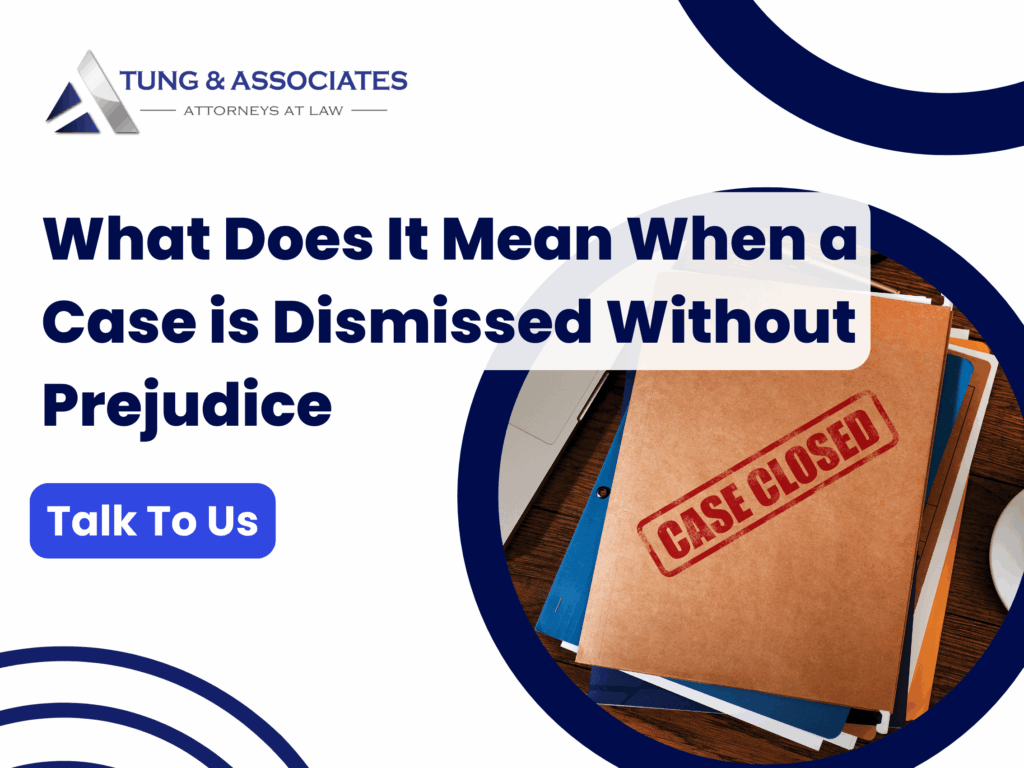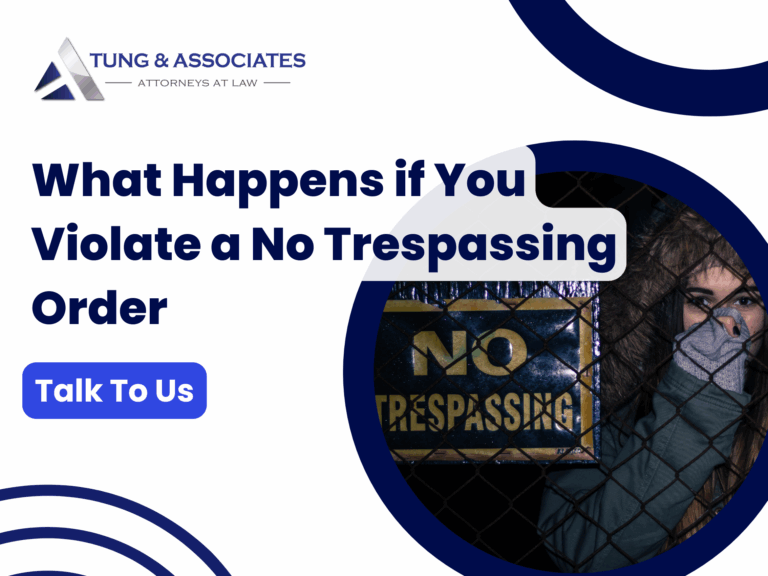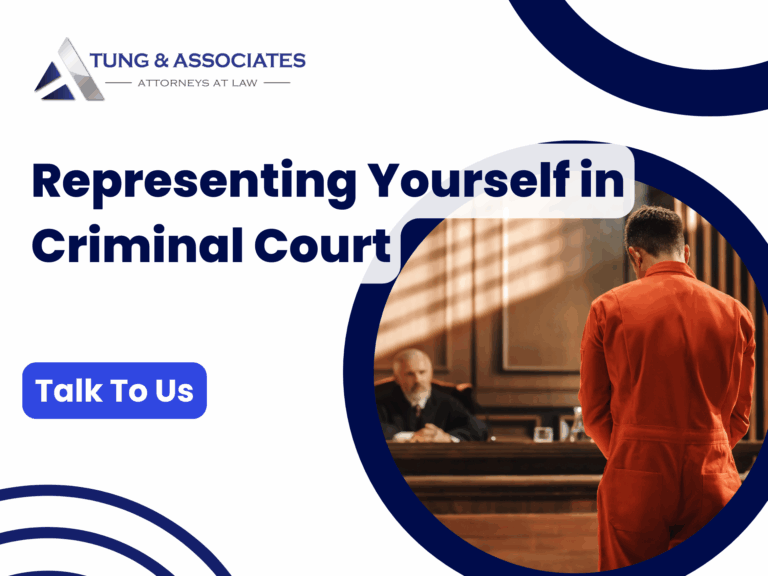A dismissal without prejudice can create confusion and uncertainty. Many people assume that once a case is dismissed, the matter is permanently closed, but that is not always true. When a case is dismissed without prejudice, the charges or claims can be brought back again later, which means your legal challenges may not be over yet.
At Tung & Associates, we understand how unsettling it is to live with that kind of uncertainty. As Pasadena criminal defense attorneys, we take the time to explain exactly what a dismissal without prejudice means in your situation and why it matters. Having a knowledgeable attorney ensures that a temporary dismissal does not turn into a future surprise.
Attorney Antony Tung has more than 16 years of experience, including time as a former prosecutor, which gives him unique insight into how prosecutors make these decisions. He has represented clients across Pasadena and throughout Los Angeles County, from Old Town and Hastings Ranch to East Pasadena and Bungalow Heaven. His compassionate approach ensures that every client feels supported while his strategic background ensures that no option is overlooked.
Working with an attorney after a dismissal without prejudice is critical because deadlines and statutes of limitation still apply. Without guidance, people may wait too long or assume their case is finished, only to face charges again later. Our role is to prepare you for those possibilities, defend your rights, and give you the peace of mind that comes with knowing you are not alone in the process.
What Does “Dismissed Without Prejudice” Mean in California?
A dismissal without prejudice is a legal ruling that ends a case for now but does not end it forever. In California, this type of dismissal means the case is closed temporarily, and the same charges or claims can be filed again later.
The most important point is that a dismissal without prejudice is not a decision on the merits of the case. The judge is not declaring one side the winner or the loser. Instead, the dismissal functions as a pause, often because of a procedural issue or timing problem that needs to be corrected before the case can move forward.
In criminal defense cases, prosecutors may drop charges without prejudice if they need more evidence, if a key witness is missing, or if they intend to refile charges in the future. For example, a DUI charge from the I-210 freeway in Pasadena might be dismissed without prejudice while the prosecution waits for lab test results to come back.
In civil cases, a plaintiff can dismiss a lawsuit without prejudice to correct a filing error or to move the case to a more appropriate court. California courts treat these dismissals as if the case was never brought, which allows the parties to start again once the issues are resolved.
The takeaway is that a dismissal without prejudice leaves the door open. It is not a guarantee that the case is gone for good, which is why working with a skilled Pasadena criminal defense attorney is essential for protecting your future.
How Is a Dismissal Without Prejudice Different from a Dismissal With Prejudice?
The difference between a dismissal without prejudice and one with prejudice is the difference between a pause and a permanent ending. When a case is dismissed with prejudice, the court has closed the matter for good and it cannot be filed again. That outcome often signals that the case lacked legal merit or that a final resolution has already been reached.
In criminal defense, a dismissal with prejudice is especially significant. It means prosecutors are barred from bringing the same charges again, which protects defendants from facing double jeopardy. For someone in Pasadena or greater Los Angeles County, that permanent closure can be life-changing because it eliminates the risk of a case resurfacing.
By contrast, a dismissal without prejudice is only temporary. Prosecutors or plaintiffs may return with the same charges or claims, provided they do so before the statute of limitations runs out. In other words, a dismissal without prejudice resets the case but does not erase it.
For clients, the key takeaway is simple: a dismissal without prejudice is not a clean win, but it does offer breathing room and another chance to prepare. A dismissal with prejudice, on the other hand, is the true finish line.
When and How Can a Case Be Dismissed Without Prejudice?
A case can be dismissed without prejudice at nearly any stage of the legal process. This can happen either because the party who filed the case requests it, or because a judge decides it is necessary. The timing and reason determine whether the dismissal is voluntary or involuntary.
Voluntary Dismissal
In California, a plaintiff in a civil case can file a Request for Dismissal to end the lawsuit without prejudice. In criminal cases, prosecutors may voluntarily dismiss charges if they realize additional evidence is needed, if they plan to file more serious charges later, or if procedural errors must be corrected first. This option keeps the door open to refile the case once the issues are resolved.
Involuntary Dismissal
Judges also have the authority to dismiss a case without prejudice on their own. Common reasons include filing errors, problems with service, or jurisdictional issues. These dismissals act as a reset, giving the parties another chance to present the case correctly in the right court.
Dismissals without prejudice can occur before trial, during trial, or even near the end of proceedings if procedural flaws come to light. In all instances, the case is treated as though it never happened, which allows it to be brought again later if the problem is corrected.
For defendants in Pasadena courts, this means a case might seem to be over one day but return unexpectedly weeks or months later. Having an attorney who tracks deadlines and potential refiling risks is the best way to avoid being caught off guard.
Why Would a Plaintiff or Prosecutor Ask to Dismiss a Case Without Prejudice?
There are many strategic and practical reasons why the party who started a case might request a dismissal without prejudice. The goal is usually to correct problems, strengthen the case, or change the forum before moving forward again.
- New Evidence or Changing Circumstances: Prosecutors often dismiss charges without prejudice if they expect stronger evidence later. For example, a DUI case from the I-210 freeway in Pasadena may be dismissed while prosecutors wait for toxicology results, with plans to refile once the lab confirms blood alcohol levels.
- Adding or Changing Parties: In civil lawsuits, plaintiffs sometimes dismiss to add defendants or refile in a different court. If damages in a Pasadena personal injury case grow beyond the state court threshold, the plaintiff may dismiss without prejudice to refile in federal court.
- Procedural Errors: Filing mistakes, like using the wrong jurisdiction or leaving out critical details, can derail a case. Rather than risk a permanent dismissal, the plaintiff may withdraw the case without prejudice and refile correctly.
- Settlement or Partial Resolution: Sometimes a dispute resolves outside court, such as a defendant paying off debts or agreeing to terms. The plaintiff may dismiss the case without prejudice, leaving the option to return if the agreement falls apart.
- Unavailable Parties or Witnesses: If the defendant cannot be located for service, or if a key witness is temporarily unavailable, prosecutors and plaintiffs may pause the case. Dismissing without prejudice avoids missing deadlines while giving time to resolve those issues.
The “why” behind these requests is almost always the same: preserving the ability to come back stronger later. For defendants, that means even when a case disappears today, it may not be gone tomorrow. Having an attorney monitor these risks ensures you are prepared for whatever happens next.
Why Would a Judge Dismiss a Case Without Prejudice?
Judges can dismiss a case without prejudice even when the plaintiff or prosecutor wants to keep it alive. The purpose is usually to correct legal errors, enforce fairness, or ensure the case is being heard in the right forum.
- Lack of Jurisdiction or Improper Venue
- Defective Complaint or Procedural Issues
- Failure to Prosecute or Follow Rules
- Defendant’s Motion to Dismiss
For defendants, the important lesson is that an involuntary dismissal without prejudice does not equal a final win. It means the judge expects the other side to come back better prepared, so staying vigilant is critical.
Where Can I Get Help Understanding a Case Dismissal Without Prejudice in Pasadena?
Understanding whether your case is truly over (or only temporarily paused) can make all the difference in how you plan your next steps. A dismissal without prejudice is not the same as a permanent win, and knowing how it affects your rights requires clear legal guidance.
At Tung & Associates, we help clients across Pasadena and the San Gabriel Valley navigate the uncertainty that comes with dismissals without prejudice. Whether your case began with a DUI arrest on the I-210 freeway, a criminal charge in Los Angeles County courts, or a legal dispute closer to home, Attorney Antony Tung and our team can explain what the dismissal means for your future and what to do next.
You don’t have to face these questions alone. Call us today at (626) 416-4668 or visit our Pasadena office at 790 East Colorado Blvd, 9th Floor, Pasadena, CA 91101 for a confidential consultation. We will listen to your concerns, answer your questions, and help you protect your rights moving forward.
Take action now! Contact Tung & Associates to make sure a dismissal without prejudice doesn’t turn into an unwelcome surprise later.





